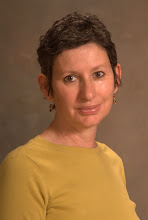Although it may be cliche, it's still true: In every challenge, lessons are derived. Here are a few of the things I learned during the past 10 months while detouring through the land of breast cancer.
1. I love to blog. This fact must be obvious to those who've been reading along. But this notion extends beyond the blogosphere. The real message is not to ignore or discount one's creative side. Don't wait until retirement, or when the kids are grown, or when the garage is cleaned to nurture your creative spirit. Whether it be writing, sketching, singing, playing an instrument, dancing or sewing, make time for it. The rewards are innumerable. (Along this line, my next blog is under development, but more on that later.)
2. People surprise you. You can never predict who will step into your life when you're in the midst of an ordeal. Without being asked, people whom you barely know will reach out in a particularly thoughtful way, and, from there, they will evolve into good friends. Conversely, others whom you counted on may not be up to the challenge.
3. Don't hesitate to connect with someone going through a bad patch. Some part of us wants to hold back and not risk the emotional fallout of talking to those who are bereaved, sick, or suffering in some way. But human contact is a good thing. Pick up the phone and dial. If people really don't want to interact, they just won't answer. But they will know that you made the effort. And that knowledge goes a long way on a bad day.
4. Ask your doctor if you have dense breasts. If so, find out what screening methods, beyond mammography, are available to you, because mammograms simply don't do a good enough job on dense tissue. No diagnostic tool can prevent cancer. But good screening can lead to early detection, which can help doctors treat cancer before it spreads. Given what I know now, I would have paid for annual breast MRIs, despite the prohibitive price tag. At the very least, I would have enrolled in the clinical trials for the Sonocine, which is a whole breast ultrasound. (You can find the link to Sonocine on the list to the right.) The most compelling evidence is this: I had a second smaller tumor, the size of a pea, in the same neighborhood as the peanut-sized growth that I discovered. This smaller lump was lying deeper in the tissue. Neither I, nor any of my doctors, could feel it, and it was not visible on my mammograms. However, the radiologist saw it on my MRI. Given its location, this little tumor could have kept growing unnoticed until it was quite large. I was fortunate, really, to have had a palpable growth close to the skin. So while MRI is very expensive, think about it if you have very dense breasts.
5. Find out what you can about your medical history. Ask older relatives about how their parents and grandparents died. Should you face a cancer diagnosis, doctors want as much genetic information as you can give them.
6. Do your research and know the facts of your condition. Doctors seem to respect this. If you can talk intelligently about your treatment, you and your doctors will have a more meaningful dialogue and you'll feel better about the decisions that everyone makes.
7. Chemo was not as bad as I feared. The best advice I heard from my oncologist was not to make assumptions about how chemo would affect me. He was right, because I fared much better than I imagined I would.
8. Fitness matters. But not for the reasons you think. There is no magic bullet that prevents serious illness. Eating broccoli and running six miles a day are no guarantee of immunity. However, should illness strike, being in excellent physical shape helps to overcome the rigors of surgery, chemo, radiation, or whatever the treatment happens to be. If you get sick, you want to be strong in order to fight back.
9. Enroll in the best health insurance plan that you can reasonably afford. If your develop a major illness, you want the freedom to select the best doctors and facilities.
10. You're stronger than you think and your loved ones are, too. You wonder how you will cope, should you develop a serious health problem.,or how your spouse or kids will manage. While the whole experience is scary, everyone will fall in line and do what needs to be done. I don't have enough distance on this experience yet to be certain, but I expect that a battlefield mentality takes over. You just move through whatever the next task is. Fretting and worry consume valuable energy that is needed elsewhere. My best advice is to check those emotions at the door and stay focused on the remedies.
My last treatment is tomorrow!!!! The next blog is getting underway. Stay tuned.
7/29/08
Subscribe to:
Post Comments (Atom)





1 comment:
Hey Cathleen, congrats on your upcoming last treatment. And thanks for the list of ten, it's something I will keep. I haven't sent a lot of comments but have been keeping up with your blog. It has been a learning experience for m and a good way to keep up on how you're doing.
You're going to start a new blog? I'll be looking forward to it.
We miss you over here at PII. Any chance of your coming back anytime soon?
I'm off to Boston area tomorrow to greet our new grandchild. She/he hasn't arrived yet, but daughter-in-law Agnieszka promised that she would wait until I get there.
Cheers
Clyde
Post a Comment